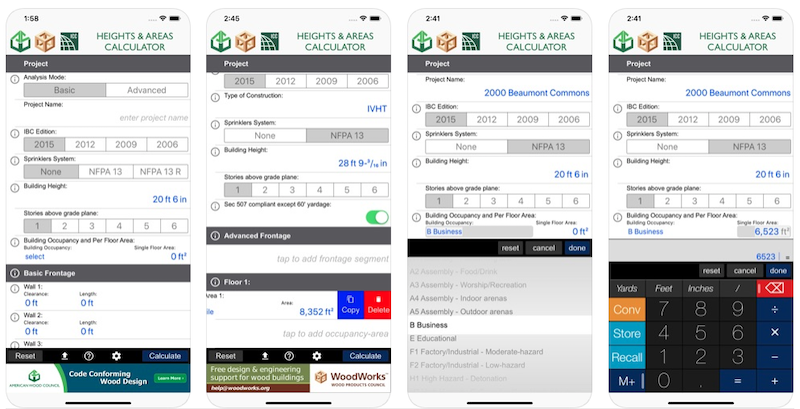A free app that calculates the maximum allowable heights and areas for buildings of various occupancy classifications and types of construction has been released.
The Heights & Areas Calculator, developed by the International Code Council, the American Wood Council, and WoodWorks, is based on provisions in the 2006 to 2015 editions of the International Building Code.
Users can input a given building geometry, site conditions (e.g., open frontage), type of construction, and occupancy.
The tool then shows allowable types of construction that are permitted. The “basic” version of the calculator limits building input to a single occupancy and equal floor areas for the entire building. An “advanced” option permits multiple occupancies and different floor areas.
“We often work with design teams that are exploring wood construction as a way to cost-effectively increase the density of their projects,” said Bill Parsons, vice president of operations for WoodWorks, in a news release. “The new heights and areas app lets building designers quickly determine if they’re maximizing value based on the objectives of the project, and to compare the options available with different construction types.”
Related Stories
| May 1, 2013
House bill would give OSHA more authority over state workplace-safety plans
A recently introduced U.S. House of Representatives bill would give the Occupational Safety and Health Administration (OSHA) more authority over state workplace-safety plans and toughen penalties for companies that knowingly violate OSHA regulations.
| May 1, 2013
New commercial landlord disclosures go into effect in California in July
Two new landlord disclosure requirements become effective in California on July 1, 2013.
| May 1, 2013
New ASHRAE residential indoor air quality standard adds carbon monoxide alarm requirement
The new 2013 version of ASHRAE’s residential indoor air quality standard adds a requirement for carbon monoxide alarms.
| May 1, 2013
AAMA publishes standard for multipoint locking hardware for side-hinged doors
The American Architectural Manufacturers Association (AAMA) recently published the first North America standard for multipoint locking hardware for side-hinged door systems.
| Apr 24, 2013
‘W visa’ program could hamper construction industry's growth
The Senate’s bipartisan immigration reform proposal will provide interim legal status to some 11 million undocumented people.
| Apr 24, 2013
North Carolina bill would ban green rating systems that put state lumber industry at disadvantage
North Carolina lawmakers have introduced state legislation that would restrict the use of national green building rating programs, including LEED, on public projects.
| Apr 24, 2013
BOMA’s 360 Performance Program approaches 600 building designees
The Building Owners and Managers Association (BOMA) International conferred the BOMA 360 Performance Program® designation upon 44 properties in major commercial real estate markets across the U.S. in the first quarter of 2013.
| Apr 24, 2013
New Mexico court strikes down move to repeal energy codes
The New Mexico State Court of Appeals struck down an attempt to repeal energy-efficient building codes.
| Apr 24, 2013
Los Angeles may add cool roofs to its building code
Los Angeles Mayor Antonio Villaraigosa wants cool roofs added to the city’s building code. He is also asking the Department of Water and Power (LADWP) to create incentives that make it financially attractive for homeowners to install cool roofs.
| Apr 17, 2013
Army's FY 2014 $130 billion budget includes $2.3 billion for construction
The U.S. Army submitted a $129.7 billion budget for fiscal year 2014, $2.3 billion of which is allocated for military construction, army family housing, and base realignment and closure.









